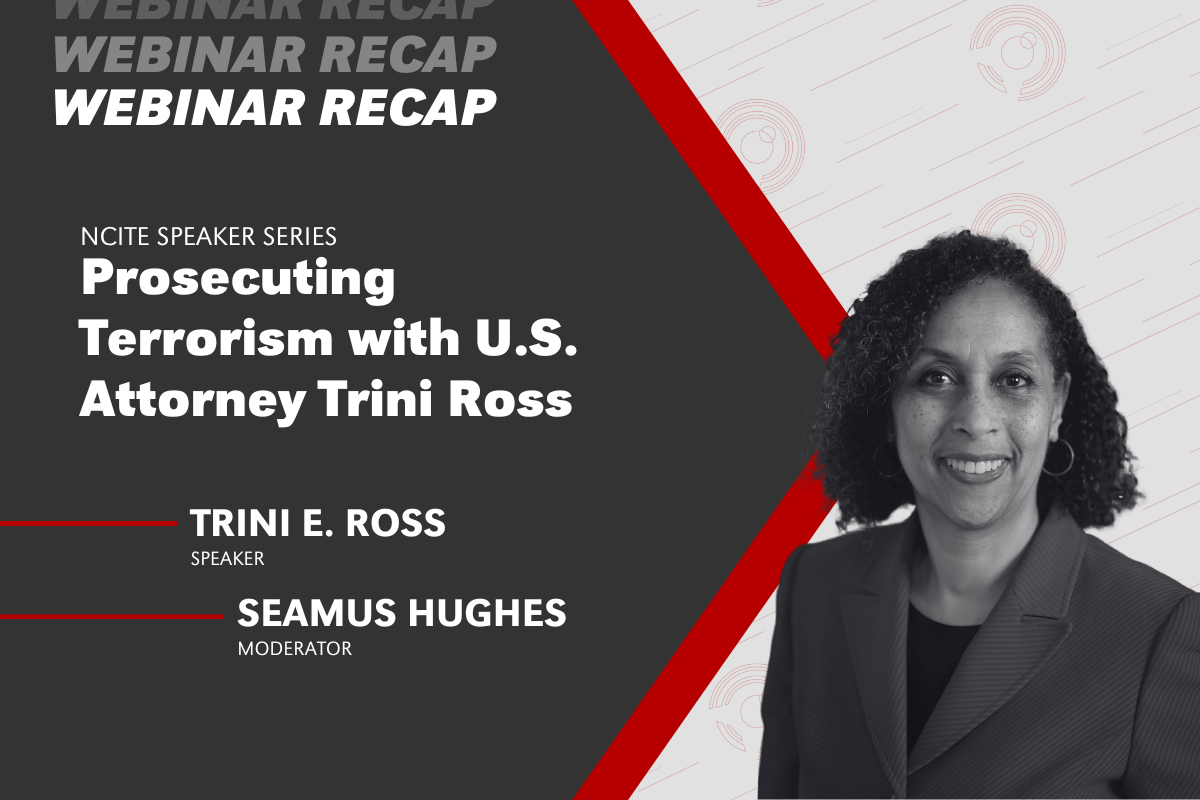WEBINAR RECAP: Prosecuting Terrorism
NCITE hosted a webinar with Trini Ross, U.S. attorney for the Western District of New York, about the challenges of prosecuting terrorism cases.
- published: 2025/01/23
- contact: NCITE Communications
- email: ncite@unomaha.edu
- search keywords:
- terrorism
- prosecution
- trini ross

On Jan. 14, NCITE hosted a webinar with Trini Ross, U.S. attorney for the Western District of New York, about the challenges of prosecuting terrorism cases. Ross’ district has a long history of prosecuting terrorism cases and, in many ways, is leading the way in structuring these prosecutions.
- Trini E. Ross became the United States attorney for the Western District of New York in 2021. She is the first Black woman to become the United States attorney in that district. As U.S. attorney, Ross is responsible for overseeing the prosecution of any federal criminal case brought within the 17 counties of western New York. In 2022, Ross was appointed to serve on the Attorney General’s Advisory Committee of U.S. Attorneys (AGAC), spending a year-and-a-half in that role. Ross also served as the director of investigations, legal division, with the National Science Foundation’s Office of Inspector General.
Key Takeaways
“Look at every tool in your prosecution toolbox.” There are many statutes that federal prosecutors can use to prosecute cases, and in complex cases they may make decisions about which charges to pursue. Prosecutors must evaluate the evidence that investigators bring to them to make sure that the elements of a violation are being met and discern which offices should be responsible for prosecuting a case.
- “We all know Al Capone was a murderer, but they got him on tax charges ... We want the charges that best fit the crime. But what we have to look at is what charges can we have a successful prosecution (with) ... Because the end result is getting that perpetrator out of society where they cannot hurt anyone else.”
The academic community can help the justice system by studying larger societal trends. Both the defense and prosecution can rely on research to, “figure out what’s going on in society, why people are making the decisions they’re making.” This can help when it comes to deciding which cases to prosecute or to send to a diversion program.
- “The academic community can help us by showing us what we don’t have the time to know as prosecutors,” Ross said.
Many considerations factor into prosecutions. Like with any other crime, Americans charged with terrorism are protected by the Constitution, and prosecutions for terrorism use the same tools as prosecutions for other crimes. Prosecutors must also make decisions about whether to prosecute other types of crimes, including crimes where there is guilt by association or cases of obstruction where someone is just a bystander.
- “Many people in these types of crimes do not want to be witnesses. They do not want to be federal witnesses for a good reason,” Ross said. “And maybe we could cultivate them and work with them to explain to them the right thing to do is to cooperate with us. And maybe we can’t, but they surely should not get caught up in the net of the criminal justice system because they’re afraid.”
Ross’s district has been seeing more cases of threats against public officials. The difficulty of prosecuting such cases depends on the evidence collected by the team. If someone made threats over the phone, prosecutors could use voice ID. However, if someone makes threats over the internet, it can be hard to prove who is the one using the computer to make those threats.
- “We have been aggressively prosecuting those cases because we want people to be public servants," Ross said. "And you shouldn’t have to subject yourself and your family members to threats because you want to serve your community, the public, the United States.”
Community outreach is vital. While law enforcement cannot be everywhere, the public is. Community outreach helps increase the number of tips and information about suspicious or criminal activities. This is why Ross' office started Feds Demystified, a monthly podcast educating the public about the processes of the federal justice system.
- “Part of my tenure has been pushing community outreach, not just of myself, but of all the attorneys in this office – and actually everybody, all the staff and attorneys in this office. Because if the community knows you, you’re a person they could trust, and they’ll come forward and they’ll tell you things ... I want people to know what we do, that we’re regular people trying to do our jobs like they are, but our job is to protect them.”